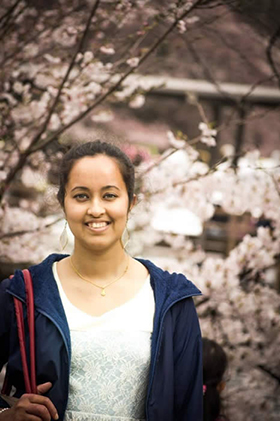
Ms. Shwetha Acharya
- From
- Karnataka
- Degree
- Ph.D. student at Research Centre for Water Environment Lab,Dept. of Urban Engineering, The University of Tokyo
Message
Please give a short introduction of yourself.
I am Shwetha Acharya from Udupi District of Karnataka. I am currently pursuing PhD at Research Centre for Water Environment Lab, Dept. of Urban Engineering, The University of Tokyo. Before joining UTokyo, I completed my master’s from Dept. of Biochemical Engineering and Biotechnology, IIT Delhi.
What is your favorite thing about Tokyo?
Tokyo is an amazing city to live in, with plenty of places to discover and events happening throughout the year. Public transport network covers all parts of the city as well as good connectivity to all other major tourist destinations in Japan. Above all, the city is clean, safe and matches many European cities in terms of quality of life.
In what way has your impression of Tokyo or Japan changed since coming here?
I had always heard about Japan for its impressive technology and hard-working people. After arriving here, I was surprised by the eye for detail, passion towards their work and punctuality of Japanese people. I was also amazed by how considerate and accommodating they are. Their ability to strike a balance between modern lifestyle and respecting their roots (traditions and customs) is praiseworthy.
What attracted you to choose The University of Tokyo as a place to study?
When I was studying my master’s at IIT Delhi, I came across Todai-IIT Scholarship and applied for it without thinking twice. I had come across several top-notch research papers from The University of Tokyo (Todai) and was assured of the best research facilities available. I also had dreamt of staying in Japan since childhood and luckily got a great opportunity to do so. Choosing to study at Todai was one of the best decisions I have taken in my life.
In what way did you adjust yourself to Japanese culture?
Japanese culture may be slightly different from Indian culture, but is ultimately very Asian in its nature. Adjusting to this culture is not very hard for someone who grew up in multicultural Indian society. Probably the only thing I had a hard time with was food, because I am a vegetarian and standard Japanese cuisine is based on fish. However, with time I was able to identify vegetarian food at convenience stores, most Japanese restaurants accommodate requests for making vegetarian dishes, vegan /veg-friendly restaurants are also quite popular. I also started cooking food regularly and luckily one of the cafeteria in the University campus offers vegan set in its menu.
Please give a message to students or researchers in your home country who may be thinking about studying in Japan?
Japan has not been a popular study destination for Indian students mainly due to language barriers and lack of knowledge about Japanese culture in general. Today, most Japanese people speak English and all Professors speak fluent English. Universities in Japan are now offering English courses and research activities can be entirely conducted in English. Learning Japanese for ease of everyday transactions is recommended but not mandatory (at least in Tokyo). Another concern for most Indians who are thinking about Japan as study destination is food especially vegetarians. I think this a problem not specific to Japan alone, even students studying in US or Europe face similar difficulties and end up cooking most of the time. Even if a student cannot find time/doesn’t have interest to cook, Indian restaurants are found in almost every nook and cranny in Tokyo. In general, curiosity and ability to walk out of your comfort zone is crucial when you study abroad, which holds true for Japan as well.
Instances of frequent earthquake in Japan is also a concern for most students. A lot of safety measures are in place, emergency drills are frequently conducted and adequate information about how to prepare for earthquake is disseminated through seminars. Natural calamities like earthquake are inevitable, but the level of preparedness is astounding and worth emulating.
After addressing concerns about general life in Japan, I would like to dwell on why Japan should be considered as a place of choice for higher studies. Apart from the excellent research facilities, the Professors are extremely passionate about research and go out of their way to bring out the best in every student. Their points of view are different from the way we think, this gives research even more interesting dimensions. Generous funding as well as encouragement to attend prestigious conferences is also a big opportunity for young researchers. Japanese researchers have strong network and collaborations and are abreast of technological developments within the country and beyond. Research exchange with alumni is also given importance. In toto, such a research environment is truly an enriching experience.
Instances of frequent earthquake in Japan is also a concern for most students. A lot of safety measures are in place, emergency drills are frequently conducted and adequate information about how to prepare for earthquake is disseminated through seminars. Natural calamities like earthquake are inevitable, but the level of preparedness is astounding and worth emulating.
After addressing concerns about general life in Japan, I would like to dwell on why Japan should be considered as a place of choice for higher studies. Apart from the excellent research facilities, the Professors are extremely passionate about research and go out of their way to bring out the best in every student. Their points of view are different from the way we think, this gives research even more interesting dimensions. Generous funding as well as encouragement to attend prestigious conferences is also a big opportunity for young researchers. Japanese researchers have strong network and collaborations and are abreast of technological developments within the country and beyond. Research exchange with alumni is also given importance. In toto, such a research environment is truly an enriching experience.

